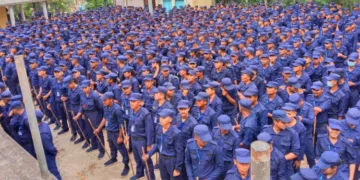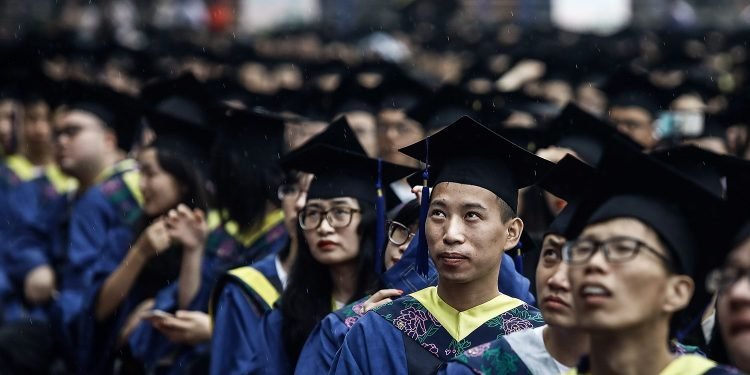China youth are becoming increasingly frustrated with their educational and employment status. A deadly combination of unemployment and over education has hit China’s youth and many young people are being forced to take up manual labour jobs just to eke out a living. Just how severe the crisis currently is, is attested by the fact that Communist Party of China (CPC) has openly encouraged graduates to consider taking up manual and blue-collar jobs. The statistics are telling. As of March 2023, 19.6 per cent of 16- to 24-year-olds were jobless, slightly downfrom last July’s record of 19.9 per cent. Those with a University education were 1.4 times more likely to be unemployed. This brings out the inability of the CPC to control the rising unemployment rate, particularly amongst the youth. The Chinese government continues to encourage youth to study thus pushing the problem down the line, rather than tackling the problem at its roots.
Just one example suffices to illustrate this point. Graduates working at a State-owned tobacco factory in Henan earn around 8,300 Yuan (around US$1,200) a month, compared with a graduate average of 5,800 Yuan (US$835) a month. One of the key issues responsible for the youth unemployment crisis is the large gap between the “reservation wage” rate that young graduates are willing to accept and the rate that firms are willing to pay. This disconnect reflects the extent to which cost of living has outpaced the growth in salaries. New graduates in big cities like Shanghai and Beijing are paid an average of only 5,290 Yuan (US$749) per month, which is just enough to rent a 25-square-meter (269 square feet) apartment. The unemployment rate of Chinese people between the ages of 16 and 24 rose to 20.4 per cent in April 2023, which tops the previous peak from last April, when China was still in full lockdown.
The news comes just one month before another 11.6 million students will graduate from college and vocational schools and enter the job market. This is precisely why former Premier Li Keqiang pledged to create 12 million jobs and subsequently, the State Council announced a set of 15 measures to tackle youth unemployment. Measures included a one-off bonus for companies that hire under-24-year-olds who are registered as unemployed and at least 1 million new internship spots, at state-owned companies and departments. Official figures show that, last fall, demand for new graduate hires fell by 12 per cent compared with the year before, while the number of job applicants almost doubled.
A report from the China Institute for Employment Research and Chinese jobs board Zhaopin showed the ratio between market demand and job applicants
was 0.57 for college graduates in the third quarter in 2022, lower than the 1.24 figure in 2021 and 1.38 in 2020. A ratio below 1 indicates fierce competition for jobs and low confidence among job seekers. In 2022, China recorded an average youth employment rate of 17.5 per cent among urbanites 16 to 24 years old. During the graduation season last July, that number hit 19.9 per cent indicating that almost 1 out of every 5 young urbanites was jobless, the highest ratio since record-keeping began in 2018.
The Chinese youth are today comparing their predicament to Kong Yiji, a protagonist of a 1919 short story by Lu Xun. Kong was a highly educated man
living in poverty because he was too proud to do manual labour. The Kong Yiji meme is the latest trend on Chinese social media describing disillusioned
youth who are rejecting the hustle culture. Other popular buzzwords have included “lying flat” and “letting it rot.” Today’s Generation Z in China meme
themselves as modern day Kong Yiji’s, pointing to their education hampering their ability to adjust to a China with diminishing employment prospects.
They dub the trend “Kong Yiji literature” and have spun it off into a song and a cartoon strip. Despite all the promises made by the CPC, the government
continues to encourage students to continue their higher education, pushing the problem down the line. One way suggested is to send graduates to
“rejuvenate the countryside on volunteer service by 2025 reminiscent of Maoist “Up to the mountains, down to the countryside” scheme. Under Mao,
young people were dispatched to villages to work under brutal and sometimes, deadly conditions.
The state media has tried to explain the Kong Yiji episode by arguing “that Kong Yiji fell into difficulties not because he was educated, but because he
couldn’t leave behind the haughty manner of a scholar, refusing to use manual labour to change his situation.” State media has also shifted the blame for the lack of jobs on the youth themselves. They have published a series of articles criticizing youth of being “too picky” about jobs and urging them to put aside their pride and do manual labour. The Communist Youth League in an article posted last month on its official WeChat account, called on young college graduates to “take off their scholar gowns … roll up their trousers and go down to the fields.”
Such state propaganda has led to angry reactions on social media from Chinese citizens. One blogger retorted, “The economy is in the toilet, and unemployment is severe. Rather than make Kong Yiji take off his scholar’s gown, how about stripping the emperor of his new clothes?”pointing a finger not so subtly at Xi Jinping. Recent data shows that youth unemployment has spiralled in the aftermath of the Covid pandemic. Before 2020, the figure was around10 per cent. President Xi’s Zero-Covid lockdowns destroyed small and medium-sized businesses across China, which normally would account for just under two-thirds of urban employment. Another way the Covid pandemic is still impacting young job seekers is that many students spent part of their college lives under the lockdown, living on campuses where their movement was highly restricted. They had fewer opportunities at internships or to gain the social experience that recruiters are looking for. While China’s economy is expected to strengthen in the coming months, the recovery will remain tenuous until consumers feel confident enough again to make big-ticket purchases — which will prompt more companies to do more hiring. Meanwhile, China’s crackdown on the property, tech, and education sectors have also meant that these traditional employers of fresh graduates are cutting back, with mass layoffs particularly visible in tech. Tech giant Alibaba alone has cut at least 15,000 jobs last year. Add to that the global economic slowdown and increasing geopolitical hostility against China.
Huawei, on the geopolitical front line, barely hired at all last year. According to Caixin, just under two-thirds of China’s top 100 companies have cut their graduate hiring quotas.
To ease domestic joblessness, Central and local governments have been rolling out measures such as state-funded employment programmes and encouraging State-Owned Enterprises to hire fresh graduates. Against the backdrop of a macro-economic slump and local financial difficulties, experts feel public-sector effort alone is not enough to absorb the increasingly large number of unemployed college students.The focus should be on how to spur and maintain confidence among private businesses. Whether such strategies will succeed hide the more serious societal problem of China’s youth.
source-Young Chinese Are Angry, Jobless, and Wondering Why They Went to University (foreignpolicy.com)
source-| Financial Times (ft.com)





















